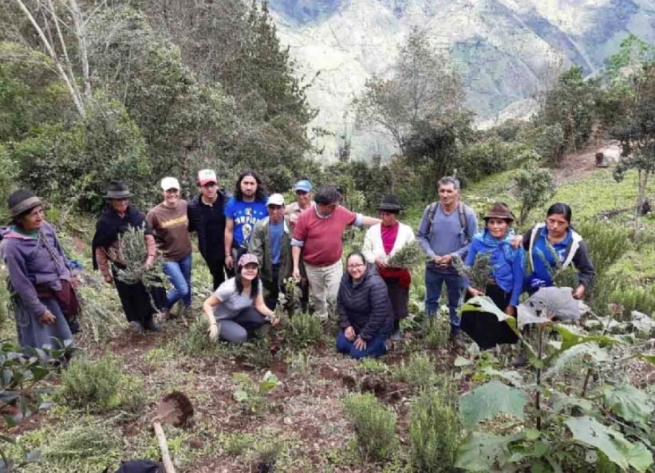ECUADOR: Salesian missionaries launch two new projects for the economic development of indigenous women

(MissionNewswire) Salesian missionaries in the indigenous community of Salinas de Guaranda in Ecuador have launched two new projects to help the local economy and provide economic opportunities for indigenous women. The first project is a factory for herbal teas and essential oils, which will impact 120 indigenous women.
The second project is focused on strengthening the production chain of aromatic plants. It includes a new production plant facility and workshops. This project will help support 200 women. These two projects have been made possible through the support of the government of Andalusia, Spain, and the Spanish Salesian organization Solidarity Don Bosco.
Staff with Solidarity Don Bosco visited Ecuador for the inauguration of a new production plant facility. Close to 150 women, who are participating in the program and are involved in plant cultivation, also came to the event in Salinas. The event was also attended by local authorities and residents.
For more than 20 years, Salesian missionaries in the region have been facilitating projects that help the most disadvantaged groups, including the creation of solidarity economy production companies. One of these companies is the brand El Salinerito, which markets many fair trade products.
“When we arrived in Salinas together with our colleagues Gabriel Terán and Lina Varón from the Salesian Planning and Development Office in Ecuador, we went to see some of these solidarity economy production companies that employ more than 60 people in Salinas,” said Begoña Simal, coordinator of projects for Solidarity Don Bosco.
On the visit, Salesian staff was able to learn more about wool, cheese and chocolate processing workshops, as well as the production of essential oils and herbal teas. These workshops were designed thanks to the support of Solidarity Don Bosco.
Salesian staff also visited a garden where the plants are cultivated. More than 200 women from the Salinas and Simiatug communities work hard in this garden to prepare the plants. They have been trained by specialists on the best methods to grow and cultivate these plants most effectively.
Unfortunately, the poor local road conditions make travel difficult. The women have organized themselves to collectively transport what they produce and bring it to the processing plant. There, a fair price is paid for the plants harvested and cleaned to proceed to the processing chain, which ends with the creation of herbal teas, tea bags, medicinal creams, essential oils and cosmetics.
“Salesian programs in Ecuador focus on education, social programs and workforce development to help the country’s most vulnerable citizens,” said Father Gus Baek, director of Salesian Missions, the U.S. development arm of the Salesians of Don Bosco. “Programs like this help indigenous women earn an income to support their families while creating products needed and used in the community.”
According to the World Bank, poverty in Ecuador has risen from 35.3 percent of the population in December 2014 to 43.8 percent in June 2019—that means 2 million more people have fallen into poverty, for a total of 7.6 million Ecuadorans living in poverty out of a total population of 17.3 million people. Ecuador is one of the most inequitable societies in the world, according to UNICEF. The richest 20 percent of the population receives almost 50 percent of the national income, while the poorest 20 percent receives only 5 percent.
According to the World Food Program, almost 26 percent of all children under age 5 have stunted growth, increasing to 31 percent in rural areas and 47 percent in indigenous communities.
Close to 20 percent of Ecuador’s population is people of indigenous heritage. For poor, rural and indigenous youth, education provides the best opportunity for finding employment, reducing inequities and breaking the cycle of poverty. Salesian missionaries have been providing education and other social programs for disadvantaged youth across Ecuador for more than 125 years.
###
Sources:
ANS Photo (usage permissions and guidelines must be requested from ANS)
ANS – Ecuador – Development project for 120 Indigenous women inaugurated
ANS – Ecuador – Solidarity economy is possible: international support for women from Salinas and Simiatug
Salesian Missions – Ecuador
UNICEF – Ecuador





